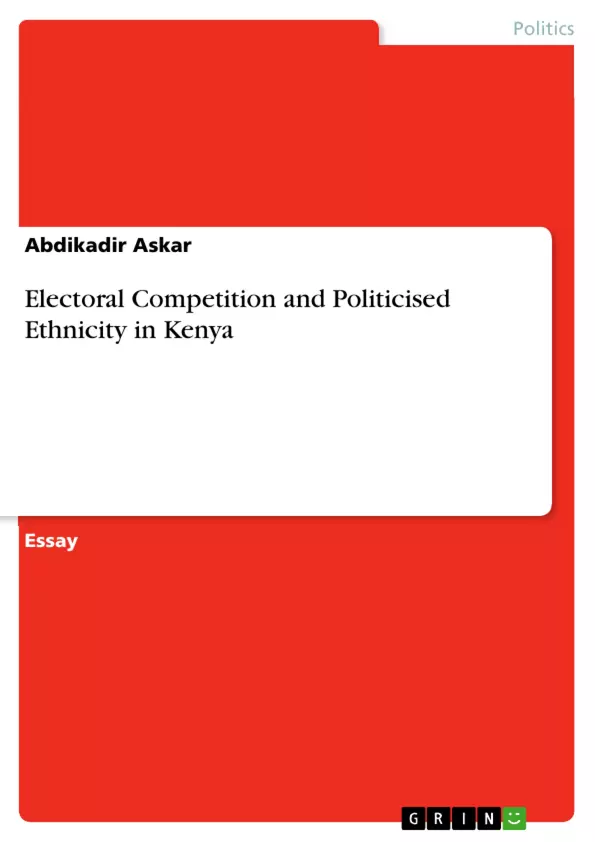Based on the instrumentalist theory of ethnic conflict, the paper examines into the theoretical understanding of how the electoral competition triggers the politicization of ethnicity and ethicized conflict in Kenya. The paper critically interrogates how the Kenyan political elites have used ethnicity as a tool to mobilize their ethnic groups promising to create political and socio-economic opportunities for them at the expense of neglecting the other tribes. Furthermore, the paper scrutinizes the trajectory of politics since 1963 up until 2007 post-election crisis and how the politicization of ethnicity created a sense of mistrust and national division among the diverse ethnic communities in Kenya.
Keyword: Electoral Competition, Politicisation of Ethnicity, Kenya
Inhaltsverzeichnis (Table of Contents)
- Introduction
- Politicisation of Ethnicity during electoral competition
- Kenya's Ethnic Landscape and Colonial Legacy
- Post-Independence Politics and Ethnic Competition
- Electoral Competitions and the Rise of Ethnic Politics
- Ethnic Divisions and the Instrumental Theory
Zielsetzung und Themenschwerpunkte (Objectives and Key Themes)
This paper examines the theoretical understanding of how electoral competition triggers the politicisation of ethnicity and ethnic conflict in Kenya. It critically interrogates how Kenyan political elites have used ethnicity as a tool to mobilise their ethnic groups, promising political and socio-economic opportunities for them at the expense of neglecting other tribes.
- The role of electoral competition in promoting ethnic politics
- The instrumentalist theory of ethnic conflict and its application to Kenya
- The impact of colonial legacy on ethnic tensions and divisions in Kenya
- The strategies employed by political elites to mobilise voters based on ethnicity
- The consequences of politicised ethnicity for national harmony and coexistence
Zusammenfassung der Kapitel (Chapter Summaries)
The introduction sets the stage for the paper by outlining the significance of ethnicity in African politics, particularly in the context of electoral competitions. It defines the concept of 'political ethnicity' and introduces the instrumentalist theory of ethnic conflict, which will be used to analyse the Kenyan case.
The first chapter delves into the politicisation of ethnicity in Kenya during electoral competition, highlighting the historical context and the role of colonial policies in exacerbating ethnic divisions. It examines how the competition for power and resources has led to the manipulation of ethnic identities by political elites, often resulting in violence and tensions between different communities.
Schlüsselwörter (Keywords)
The main keywords and focus topics of this paper are: electoral competition, politicisation of ethnicity, ethnic conflict, instrumentalist theory, Kenya, colonial legacy, political elites, ethnic mobilisation, and national harmony.
Frequently Asked Questions
How does electoral competition trigger ethnic conflict in Kenya?
Electoral competition often leads political elites to use ethnicity as a mobilization tool, creating divisions to secure votes within their own ethnic groups.
What is the "instrumentalist theory" mentioned in the paper?
This theory suggests that ethnic conflict is not natural but rather manufactured by leaders who use ethnic identity to achieve political or economic goals.
What role did the colonial legacy play in Kenya's ethnic landscape?
Colonial policies often favored certain groups or used "divide and rule" tactics, laying the historical foundation for modern ethnic tensions.
What were the consequences of the 2007 post-election crisis?
The crisis highlighted deep national divisions and a sense of mistrust among diverse communities, resulting from years of politicized ethnicity.
How do Kenyan political elites manipulate ethnic groups?
They promise socio-economic opportunities exclusively to their tribes, often at the expense of neglecting or marginalizing others.
- Citar trabajo
- Abdikadir Askar (Autor), 2017, Electoral Competition and Politicised Ethnicity in Kenya, Múnich, GRIN Verlag, https://www.grin.com/document/430884



